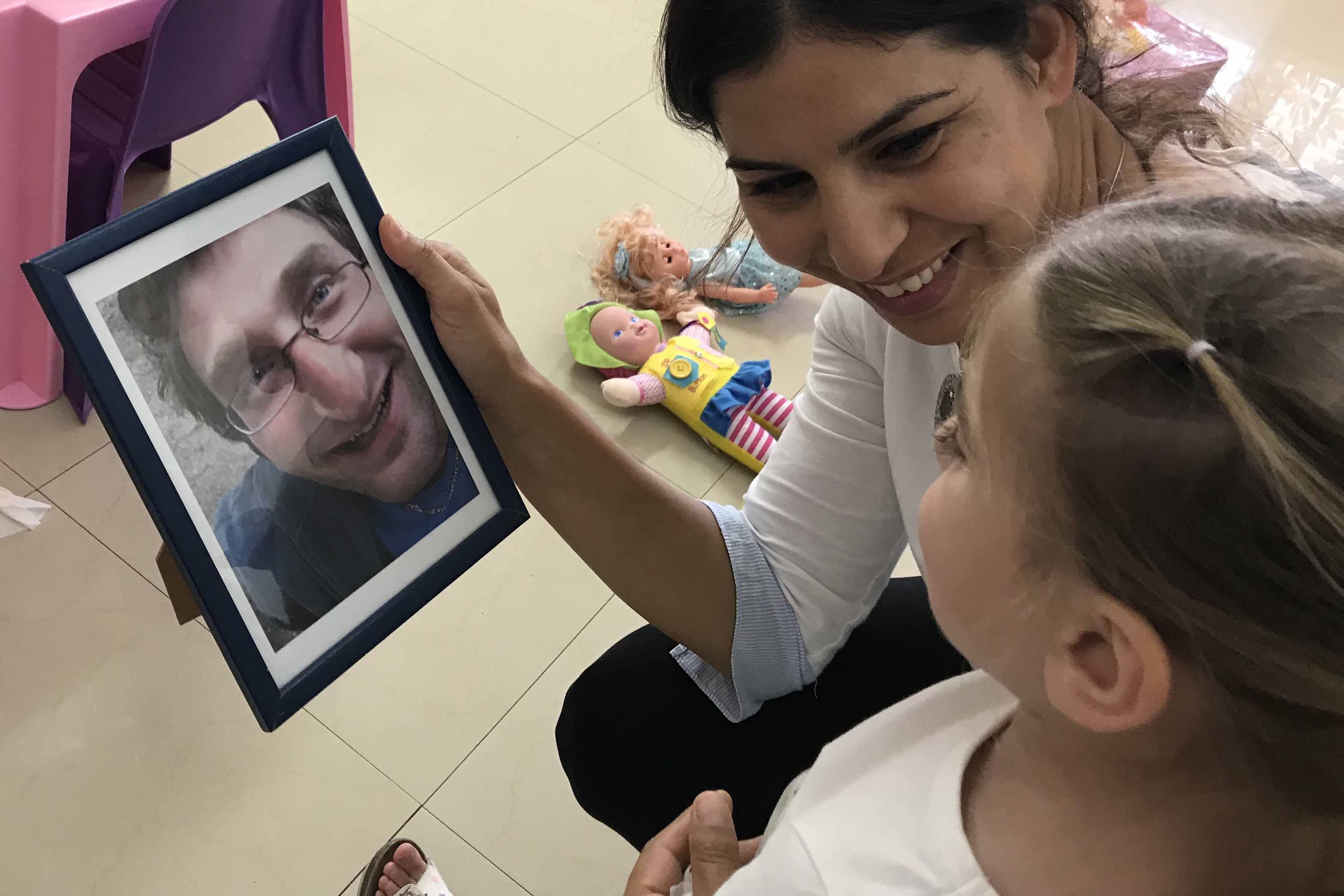In Israel, Becoming a Dad After Death
More than four years ago, Liat Malka waited anxiously for a sperm sample from a deceased man she had never met to fertilize her solitary egg in a hospital petri dish. The Israeli kindergarten teacher hoped to undergo in-vitro fertilization and was disappointed when, in the first attempt, her egg and the donor sperm failed to create a viable embryo. The next month, though, brought success. Malka had an embryo transferred into her uterus and nine months later gave birth to Shira, whose name was chosen because it means both “song” and “prayer” in Hebrew.
Sometimes, Shira looks at a picture of her father. In a two-bedroom apartment in the southern Israeli city of Ashkelon that she shares with her mother and grandmother, Shira has grown up seeing this man, smiling back at her with a wide grin and kind, bespectacled eyes. When she was younger, she called him by his first name, Baruch. Recently, Malka has been trying to get her to call him Daddy. “Look how nicely he smiles. That’s Daddy,” says Malka, gently, as they stand in front of the photo.
Over the past two decades, posthumous reproduction has occurred throughout the world in modest but growing numbers. In this version of assisted reproduction, men donate their genetic material in life, or have it extracted after death, so that they may continue their genetic lineage. Experts predict that the number of these procedures is likely to increase as reproductive technology gains prevalence and as “alternative families,” composed of combinations beyond the traditional heterosexual, two-parent set-up, gradually gain acceptance. Israel, an exceptionally pro-natalist country with the highest usage of IVF per capita, is a thriving laboratory for this novel way of family-making.
But this isn’t without controversy. Because the Israeli state regulates and funds IVF, it also determines who has access to the procedure. Currently, all women up to the age of 45 are eligible for unlimited funds for up to two “take-home” babies, and for procedures using genetic material from deceased spouses. Things get blurry, however, when the deceased’s parents request posthumous reproduction in order to create a living descendant. In such instances, the courts decide on a case-by-case basis. Over the past decade, complex cases have come forward involving various types of wills and an array of interested parties. Legal experts and rabbis, among others, have raised concerns that posthumous reproduction violates the rights of the unborn child. Meanwhile, experts in other parts of the world worry about the lack of adequate government and medical regulation as the procedure begins to gain traction globally.
For her part, Malka discovered the procedure at the age of 35, after learning from her doctor that her egg reserve was severely depleted. She researched sperm banks for an anonymous donor but was unsettled by the idea that her child would only know her side of the family. She was also worried that in such a small country, her child risked one day meeting, and unintentionally partnering with, a half-sibling.
Eventually, she came across a video that Julia and Vlad Pozniansky had posted on YouTube. The couple was seeking legal permission to release sperm that their 25-year-old son, Baruch, had cryogenically frozen days before dying from cancer. His intent to preserve his sperm and have it used to inseminate a woman was specifically described in a “biological will,” a legal document initiated by the Poznianskys’ lawyer, Irit Rosenblum.
Malka contacted Rosenblum, the founder of New Family, an organization that provides legal support to non-traditional Israeli families, who arranged for her to meet the couple face-to-face. The three individuals went on to sign a contract stipulating that Malka would use Baruch’s sperm to get pregnant. Malka added clauses which she hoped would prevent potential future complications. She kept money out of it and gave Shira’s grandparents visitation rights at least every three weeks. After a year of bureaucratic delays and ongoing debates to determine the validity of Baruch’s biological will, the court finally ruled in his family’s favor. In 2015, Shira was born.
Malka recalls that the boundaries in her legal contract felt especially critical during her pregnancy, when the reality of her situation suddenly hit her. “These were people I didn’t really know,” she said. “I told [the Poznianskys], give me time.” Only after Shira’s birth did Malka start to love them and view the couple as family.
Julia Pozniansky said the bureaucratic and legal struggles were worth it. The case garnered extensive media coverage, she noted, and demonstrated that posthumous reproduction need not be viewed as science fiction, but as a procedure that needed wider support. Her appearances in the Israeli press were a chance to correct misconceptions and present a public plea that she hoped would silence the procedure’s critics. “I would say to whoever is against it, let’s also give up on penicillin because that was also once seen as interfering with divine punishment” she said, sardonically. “If we don’t make a step forward, if we say, ‘no it’s not allowed,’ [miracles] will never open up before us.”

In Israel, IVF is one of the rare issues supported by nearly all sectors, regardless of religion or sexuality, in an infamously divided society. “There’s a very strong urge to have children here,” said Julia Pozniansky, who immigrated to Israel from Russia with her husband and two sons several decades ago. After losing Baruch to cancer, she underwent IVF at the age of 55 and gave birth to another son with the use of a donor egg. “There’s tradition, family, 2,000 years of persecution in which we’ve needed to rise from the ashes to create life.” Like many Jewish Israelis, Pozniansky sees reproduction as a way to replenish the numbers of the Jewish people in the wake of the Holocaust, and millennia of Jewish suffering.
Of her legal focus, Rosenblum says her upbringing has motivated her to “help families not just to survive, but to live.” Both of Rosenblum’s parents had numbers tattooed on their forearms from time they spent in concentration camps before immigrating to Israel. Holiday dinners, she recalled, were never with relatives, but with neighbors, who had also lost entire extended families in the Holocaust.
As semi-official state policy, Israel has encouraged Jewish residents to have children with the goal of sustaining a Jewish majority and, more recently, to counter the higher fertility rates of Palestinians in the occupied territories. After the 1967 War, in which Israel conquered East Jerusalem, the West Bank, Gaza, and the Golan Heights, bringing a million more Palestinians under Israeli rule, the Israeli demographic center was established to increase Jewish birthrates, a mission the government described as essential to the survival of the Jewish people. 1.7 million Arab citizens within Israel’s borders are also entitled to state-paid fertility treatments. There are no statistics on their representation as IVF patients, though there is at least one known case of an Arab-Israeli couple recently undergoing posthumous IVF.
Several posthumous reproduction cases were recorded in the mid-1990s, in which both spouses and genetically-related family members filed requests, but the issue was thrust into the national spotlight because of one of the most sensitive issues in Israeli society: the death of a young soldier. On August 20, 2002, during the Second Intifada, Staff Sgt. Keivan Cohen was shot by a Palestinian sniper during a military operation in the Gaza Strip. His mother, Rachel, contacted Rosenblum and trudged through a decade-long battle to use her son’s sperm to impregnate a woman of her family’s choosing.
“That parents don’t get a choice about mandatory conscription, that they sacrifice their children to the state, raises this very Israeli concept that this is something the state ‘owes them,’” said Vardit Ravitsky, an associate professor of bioethics at the University of Montreal. Because of compounded traumas prevalent in Israel’s national narrative, the arguments regarding posthumous reproduction have always been “to err on the side of life,” she said.
In 2007, the courts determined that Keivan Cohen had, indeed, wanted children, even though he had not left his will in writing and did not know the woman whom his parents would choose to raise his child. In November of 2013, a baby girl was born to a single mother 11 years after her father’s death and the child was determined his legal heir. The decision paved the way for other landmark cases. In 2009, a family relations court in Haifa approved the verbal biological will of Idan Snir, who died of cancer at the age of 22. In 2011, the court also recognized the written biological will of Baruch Pozniansky, the father of now three-year-old Shira.
In contrast to the lengthy legal procedures, posthumous sperm retrieval is surprisingly simple. Sperm remain viable 24 to 36 hours after death, and in rare conditions, doctors say, can remain active for as long as 72 hours. For patients kept alive artificially, doctors can use an electric shock to stimulate ejaculation. For other cases, doctors can insert a needle into the testes or perform a biopsy to retrieve sperm. They may also remove the entire testes, and then the sperm, or freeze everything for later extraction.
In all possible scenarios, “the problem with sperm production is not the technology, which is easy, but rather the more emotional social, ethical, and legal issues,” Igal Madjar, then-director of the male fertility center at the Tel Hashomer Hospital sperm bank, told a Ministry of Justice committee in 2003.
That committee, which included doctors, philosophers, lawyers, and rabbis, advised on official guidelines on posthumous reproduction, which were then issued by the Attorney General. Ravitsky, the bioethicist, was among the participants. She recalls that there was an almost complete consensus that the procedure should be allowed to continue. Even conservative rabbis agreed that posthumous reproduction posed no problems and, in fact, could constitute a mitzvah, or good deed, with biblical precedents.
Creating a two-step process, the Ministry of Justice committee generally agreed to allow the process of posthumous extraction, but left the use of that genetic material to the future discretion of the courts. The guidelines, however, limited the approval of requests for sperm retrieval to women only and denied them in cases where parents filed the request. Moreover, they failed to specify courses of action for complex scenarios that would arise in the future.
Since then, the legal evolution of posthumous reproduction has not gone smoothly. Until today, Israeli courts have failed to coherently answer the question posed by Ruth Landau, a social work expert from the Hebrew University of Jerusalem: Is it ethical to create a child as “the means for fulfilling the wishes of an adult, in any way possible, and at any cost?” Because the right to posthumous reproduction is not a given for the deceased’s parents, their requests, in particular, have challenged the courts with esoteric questions regarding the rights of an unborn child.
In 2017, one judge overturned another judge’s decision allowing parents intending to use their deceased son’s sperm to create a child, whom they would raise as their own. The young girlfriend of the deceased had supported the insemination of her boyfriend’s sperm in another woman but objected to personally carrying the baby. While the court recognized the “presumed will” of the deceased and the desire of the parents to fulfill their son’s wishes, it nevertheless maintained that parents did not have the right to the sperm, and asserted that permitting such a case could cause potential harm to the child. Joseph Schenker, the president of the International Academy of Human Reproduction, commended the decision. He asserted that “planned orphanhood” threatens to create an identity crisis in the future child. The problem, he said, is that society does not know how such a child “will feel to know that he is not an individual, but a copy of someone else” — what Israeli judges in the past have called a “living monument to the dead.”

Although individual cases are occasionally rejected or delayed in the courts, experts say the trend is moving toward allowing posthumous reproduction to progress. For years, Rosenblum has pushed for the establishment of an opt-out Israeli military sperm bank — “life insurance” — which she said would have young Israelis thinking more seriously about their posthumous wishes. Because of the cross-border nature of modern fertility, she also has international ambitions to make biological wills the standard. She has consulted with U.S. military leaders to encourage the creation of a subsidized system for cryopreserving sperm and eggs, which came to pass in 2016. Earlier this year, she consulted on a bill for the creation of a version of the biological will in Ireland.
Kathryn O’Sullivan, a family law expert and lecturer at the University of Limerick, notes that discussion of posthumous assisted reproduction is gaining global traction. While France, Germany, and Sweden have all opted for prohibition, other countries, such as Ireland, are developing laws to permit it. Such legal frameworks will also have to consider pertinent issues like inheritance and child support requirements.
On the whole, experts warn, as the practice increases internationally in numbers and attention, legislation has mostly left the issue in a dangerous kind of limbo. In the U.S., a lack of adequate federal or state oversight has pushed the multi-billion-a-year fertility industry onto an aggressive, entrepreneurial track, ripe for malfeasance. And once a child is born through posthumous reproduction, states offer varying legal rights. “Whether the decisions are difficult or not, leaving an issue like this unregulated will only create problems down the line,” said O’Sullivan.
“It’s not going to be going away,” she added.
Historically, reproduction has remained sensitive in the U.S. because of the politicization of abortion rights, experts say. Further, Shelly Simana, an Israeli doctoral degree candidate at Harvard Law School, said that posthumous reproduction presents an especially off-putting predicament for Americans since they tend to “not like to think about death.” The American Society for Reproductive Medicine ethics committee has mirrored the Israeli guidelines prioritizing the spouse over parents of the deceased and requiring a waiting period before the material can be used. But because laws in this realm are inconsistent and difficult to enforce, however, there have been several cases of parents using their deceased children’s genetic material to create a child, said Simana.
There are also health and safety issues to consider. In the U.S., posthumous sperm and egg retrieval are performed without a uniform protocol across clinics. Further, Arthur Caplan, director of the Division of Medical Ethics at New York University Langone Health, said he’s not confident that enough clinical research has been done to ensure patients that posthumous IVF is entirely risk-free. “We don’t have a long-term registry to see how well the sperm do, how active [they are], if they’re healthy if you wait five hours as compared to 15 hours” post-extraction, said Caplan. “That is very disturbing.”
Back in Israel, Liat Malka, says that despite all the risks, she and Shira today live a charmed life. After Shira finishes kindergarten, they often head to the beach or dance to Shira’s favorite music in their living room. “It’s just me and her, doing what we like,” she said. Malka takes comfort in knowing that she and Baruch Pozniansky accomplished something beautiful by “creating a happy person,” she said. One day Shira will understand that Baruch was wishing for her, Malka said, “and I will teach her that he is somewhere, knowing about her.”
Shira Rubin is an American journalist based in Tel Aviv. Her work has appeared in the Daily Beast, the Christian Science Monitor, and The Atlantic, among other publications.











Comments are automatically closed one year after article publication. Archived comments are below.
I think this is both a sad and a lovely story. There is a wanted and loved child in the world who would not be here if it weren’t for modern science and the will to use it. I am also glad that the mother has a relationship with the young deceased father’s parents. Too often grandparents are left out of their grandchildren’s lives as these could have been if the little girl’s mother had not developed a relationship with them.